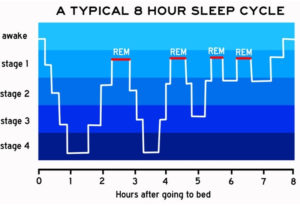When sleep is routinely interrupted, or fragmented, the sleep cycle and circadian rhythm can be disrupted. This disruption is dangerous to overall health and well-being, in the long-term and the short-term. Poor sleep quality and circadian rhythm disruption are linked to a higher risk of a wide variety of diseases and chronic health conditions, as well as to mood disorders and cognitive performance issues. In a recent McGill University study, researchers found that mothers – but not fathers – of more than one child are particularly at risk of suffering from fragmented sleep.
What the Sleep Fragmentation Study Found
 Conducted by Samantha Kenny, a doctoral student at McGill University, under the supervision of Department of Educational and Counseling Psychology Assistant Professor Marie-Hélène Pennestri, the study was based on a group of 111 parents. That group included three single mothers and 54 parenting couples. The researchers tracked each group member’s sleep patterns for two weeks.
Conducted by Samantha Kenny, a doctoral student at McGill University, under the supervision of Department of Educational and Counseling Psychology Assistant Professor Marie-Hélène Pennestri, the study was based on a group of 111 parents. That group included three single mothers and 54 parenting couples. The researchers tracked each group member’s sleep patterns for two weeks.
Researchers found that the overall quantity of sleep for the mothers didn’t vary according to the number of children they had. However, those with just one baby tended to have a better quality of sleep with fewer interruptions. Mothers of more than one child tended to have a poorer quality of sleep, and sleep that was more fragmented by interruptions. Interestingly, the fathers in the study experienced no change in sleep quality whether they had one child or multiple children.
Researchers Question Disparate Impact
Noting the difference in the degree of sleep fragmentation between mothers and fathers, researchers plan to delve deeper into that topic in future research. However, the researchers did point to couples striving towards a more equitable division of child-rearing tasks, during both the day and the night, as a means of reducing the mother’s greater rate of sleep interruption. Even today, women – even those working outside of the home – typically do more of the child-rearing related labor than their male partner.
This pattern of unequal division of childcare tasks can happen even in homes where a conscious effort is made to divide household chores equitably. It can often develop into a habit unintentionally, such as when the mother breastfeeds. Clearly, the father can’t breastfeed and when one or both parents have to get up for work, it doesn’t make sense to have both getting up with the baby at night when the mother is going to be doing the feeding. The problem comes when this becomes a long-standing habit, where the mother becomes habitually responsible for nighttime parenting issues.
Common Causes of Fragmented or Interrupted Sleep
While mothers of multiple children are more likely to experience disrupted sleep, fragmented sleep is a sleep problem that can impact anybody at any age, including children and adolescents. Some common causes of sleep fragmentation include stress, anxiety, alcohol or drug use, some sleep-inducing medications, daytime napping and a lack of consistency in waking and sleeping times. Sleep apnea, heavy snoring, feeling itchy or scratching a lot during sleep, periodic strong leg movements and excessive screen time, especially right before bedtime, can also contribute to interrupted sleep.
Health Implications of Fragmented Sleep
This type of interrupted sleep can be very damaging to overall health and well-being. That’s because it disrupts multiple cycles essential to optimal health, mood maintenance and cognitive functioning. Poor quality sleep is disruptive to the circadian rhythm, interferes with restorative deep sleep and has a negative impact on REM sleep. Studies have linked sleep fragmentation to hardening of the arteries, chronic inflammation and it may be a migraine headache trigger.
Routinely disrupting the circadian rhythm can interfere with the timing of various body systems, including hormone production and release, the metabolic system and the cardiovascular system. That can heighten the risk of a wide range of common diseases and chronic health conditions, including cardiovascular disease and stroke. A higher risk of developing hormone-related cancers, such as breast cancer and metabolic system diseases, including diabetes, have been associated with circadian rhythm disruption. So, too, have mood disorders, including anxiety and depression, and cognitive function impairment, such as decreases in memory and complex task performance.

Make Time for Quality Sleep
Getting enough quality sleep is a major factor in short-term and long-term health and well-being. It can be tempting to let social, work and extra-curricular school activities eat into available sleep time or to fall into old patterns of childcare that leave one partner struggling with the bulk of nighttime sleep interruptions. Be conscious of the health consequences of insufficient, interrupted and poor quality sleep. Prioritizing good sleep hygiene for all family members, including mothers, is a smart way to help keep the whole family healthy.







